-
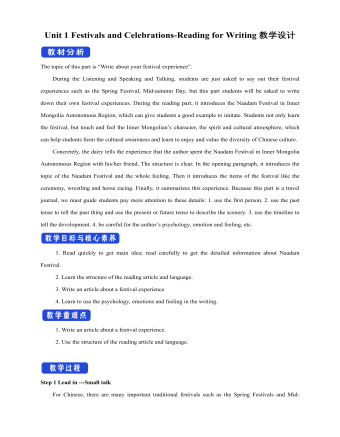
新人教版高中英语必修3Unit 1 Festivals and Celebrations-Reading for Writing教学设计一
The topic of this part is “Write about your festival experience”.During the Listening and Speaking and Talking, students are just asked to say out their festival experiences such as the Spring Festival, Mid-autumn Day, but this part students will be asked to write down their own festival experiences. During the reading part, it introduces the Naadam Festival in Inner Mongolia Autonomous Region, which can give students a good example to imitate. Students not only learn the festival, but touch and feel the Inner Mongolian’s character, the spirit and cultural atmosphere, which can help students form the cultural awareness and learn to enjoy and value the diversity of Chinese culture.Concretely, the dairy tells the experience that the author spent the Naadam Festival in Inner Mongolia Autonomous Region with his/her friend. The structure is clear. In the opening paragraph, it introduces the topic of the Naadam Festival and the whole feeling. Then it introduces the items of the festival like the ceremony, wrestling and horse racing. Finally, it summarizes this experience. Because this part is a travel journal, we must guide students pay more attention to these details: 1. use the first person. 2. use the past tense to tell the past thing and use the present or future tense to describe the scenery. 3. use the timeline to tell the development. 4. be careful for the author’s psychology, emotion and feeling, etc.1. Read quickly to get main idea; read carefully to get the detailed information about Naadam Festival.2. Learn the structure of the reading article and language.3. Write an article about a festival experience4. Learn to use the psychology, emotions and feeling in the writing.1. Write an article about a festival experience.2. Use the structure of the reading article and language.
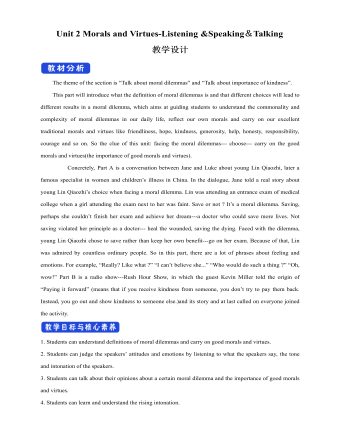
新人教版高中英语必修3Unit 2 Morals and Virtues-Listening &Speaking&Talking教学设计
Example:One day, a poor boy who was trying to pay his way through school by sending newspapers door to door found that he only had one dime(一角)left. He was so hungry that he decided to beg for a meal at the next house.However, he lost his nerve when a lovely young woman opened the door. Instead of a meal he asked for a drink of water. She thought he looked hungry so she brought him a large glass of milk. He drank it slowly, and then asked, “How much do I owe you?” “You don’t owe me anything,” she replied, “Mother has taught me never to accept pay for a kindness.” “Then I thank you from the bottom of my heart.” With these words, Howard Kelly left that house.Years later the woman became badly ill and was finally sent to the hospital in a big city. Dr. Howard Kelly, now famous, was called in. When he heard the name of the town she came from, a strange light filled his eyes. Dressed in his doctor’s clothes, Dr. Kelly went into her room and recognized her at once. From that day on, he gave special attention to her, and decided to do his best to save her life.At last the woman was saved. Dr. Kelly asked the business office to pass the final bill to him. He looked at it and then wrote something on the side. The bill was sent to the woman’s room. She was afraid to open it because she was sure that it would take the rest of her life to pay for it off. Finally she looked, and the note on the side of the bill caught her attention. She read these words: “Paid in full with a glass of milk, Dr. Howard Kelly.” Tear of joy flooded her eyes.
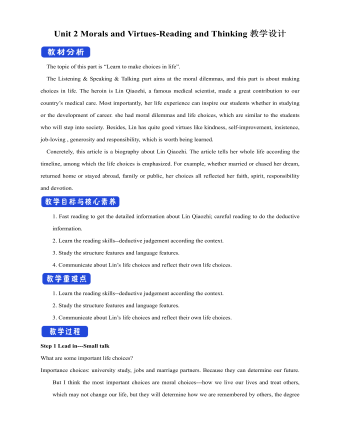
新人教版高中英语必修3Unit 2 Morals and Virtues-Reading and Thinking教学设计
The topic of this part is “Learn to make choices in life”.The Listening & Speaking & Talking part aims at the moral dilemmas, and this part is about making choices in life. The heroin is Lin Qiaozhi, a famous medical scientist, made a great contribution to our country’s medical care. Most importantly, her life experience can inspire our students whether in studying or the development of career. she had moral dilemmas and life choices, which are similar to the students who will step into society. Besides, Lin has quite good virtues like kindness, self-improvement, insistence, job-loving , generosity and responsibility, which is worth being learned.Concretely, this article is a biography about Lin Qiaozhi. The article tells her whole life according the timeline, among which the life choices is emphasized. For example, whether married or chased her dream, returned home or stayed abroad, family or public, her choices all reflected her faith, spirit, responsibility and devotion.1. Fast reading to get the detailed information about Lin Qiaozhi; careful reading to do the deductive information.2. Learn the reading skills--deductive judgement according the context.3. Study the structure features and language features. 4. Communicate about Lin’s life choices and reflect their own life choices.1. Learn the reading skills--deductive judgement according the context.2. Study the structure features and language features.3. Communicate about Lin’s life choices and reflect their own life choices.Step 1 Lead in---Small talkWhat are some important life choices?Importance choices: university study, jobs and marriage partners. Because they can determine our future.
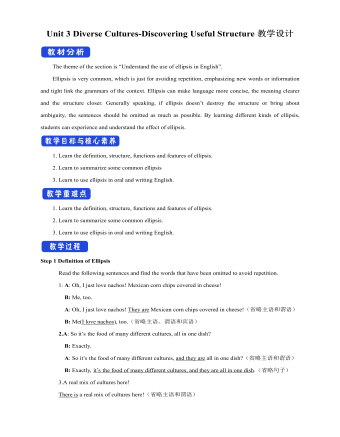
新人教版高中英语必修3Unit 3 Diverse Cultures-Discovering Useful Structure教学设计
Step 4 PracticeRead the conversation. Find out which words have been left out.Justin: Linlin, I’m going to Guizhou Province next month. I’m super excited! Any recommendations for places to visit?Linlin: Wow, cool! Guizhou is a province with a lot of cultural diversity. Places to visit...well, definitely the Huangguoshu Waterfall first.Justin: What’s special about the waterfall?Linlin: Well, have you ever heard of the Chinese novel Journey to the West ?Justin: Yes, I have. Why ?Linlin: In the back of the waterfall, you will find a cave, which is the home of the Monkey King.Justin: Really? Cool! I’ll definitely check it out.Linlin:And I strongly recommend the ethnic minority villages. You’ll find Chinese culture is much more diverse than you thought.Justin:Sounds great, thanks.Answers:Justin: Linlin, I’m going to Guizhou Province next month. I’m super excited! Do you have any recommendations for places to visit?Linlin: Wow, that’s cool! Guizhou is a province with a lot of cultural diversity. What are some places to visit in Guizhou ? Well, definitely the Huangguoshu Waterfall is the first place to visit in Guizhou Province.Justin: What’s special about the waterfall?Linlin: Well, have you ever heard of the Chinese novel Journey to the West ?Justin: Yes, I have heard of the Chinese novel Journey to the West . Why do you ask if I have heard of the Chinese novel Journey to the West?Linlin: In the back of the waterfall, you will find a cave, which is the home of the Monkey King from Journey to the West.Justin: That’s really true? It’s Cool! I’ll definitely check it out.Linlin:And I strongly recommend the ethnic minority villages on your trip to Guizhou Province. You’ll find Chinese culture is much more diverse than you thought it was.Justin:This all sounds great, thanks.
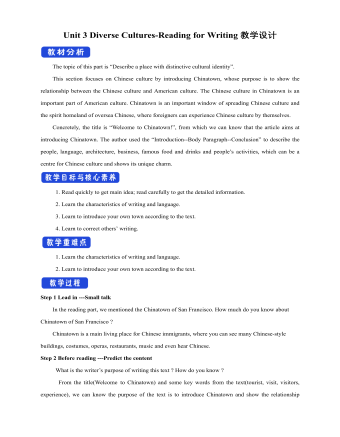
新人教版高中英语必修3Unit 3 Diverse Cultures-Reading for Writing教学设计
The topic of this part is “Describe a place with distinctive cultural identity”.This section focuses on Chinese culture by introducing Chinatown, whose purpose is to show the relationship between the Chinese culture and American culture. The Chinese culture in Chinatown is an important part of American culture. Chinatown is an important window of spreading Chinese culture and the spirit homeland of oversea Chinese, where foreigners can experience Chinese culture by themselves.Concretely, the title is “Welcome to Chinatown!”, from which we can know that the article aims at introducing Chinatown. The author used the “Introduction--Body Paragraph--Conclusion” to describe the people, language, architecture, business, famous food and drinks and people’s activities, which can be a centre for Chinese culture and shows its unique charm.1. Read quickly to get main idea; read carefully to get the detailed information.2. Learn the characteristics of writing and language.3. Learn to introduce your own town according to the text.4. Learn to correct others’ writing.1. Learn the characteristics of writing and language.2. Learn to introduce your own town according to the text.Step 1 Lead in ---Small talkIn the reading part, we mentioned the Chinatown of San Francisco. How much do you know about Chinatown of San Francisco ?Chinatown is a main living place for Chinese immigrants, where you can see many Chinese-style buildings, costumes, operas, restaurants, music and even hear Chinese.Step 2 Before reading ---Predict the contentWhat is the writer’s purpose of writing this text ? How do you know ?From the title(Welcome to Chinatown) and some key words from the text(tourist, visit, visitors, experience), we can know the purpose of the text is to introduce Chinatown and show the relationship between Chinese culture and American culture.
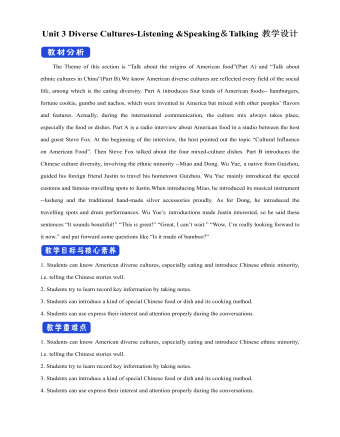
新人教版高中英语必修3Unit 3 Diverse Cultures-Listening &Speaking&Talking教学设计
1. In Picture 1 and Picture 2, where do you think they are from? How do you know?From their wearings, we can know they are from ethnic minority of China--- Miao and Dong.Picture 1, they are playing their traditional instrument lusheng in their traditional costumes.Picture 2. the girls are Miao because they wear their traditional costumes and silver accessory.2. In Picture 3, can you find which village it is? What time is it in the picture?It is Dong village. It is at night. Step 2 While-listeningJustin met a new friend while traveling in Guizhou. Listen to their conversation and complete the summaries below.Part 1Justin and Wu Yue watched some Miao people play the lusheng. The instrument has a history of over 3,000 years and it is even mentioned in the oldest collection of Chinese poetry. Then they watched the lusheng dance. Justin wanted to buy some hand-made silver/traditional accessories as souvenirs. He was told that the price will depend on the percentage of silver. Part 2They will go to a pretty Dong minority village called Zhaoxing. they will see the drum towers and the wind and rain bridges. They may also see a performance of the Grand Song of the Dong people.Step 3 Post-listening---TalkingWork in groups. Imagine Justin is telling some friends about his trip to Guizhou. One of you is Justin and the rest of you are his friends. Ask Justin questions about his trip and experience. The following expressions may help you.
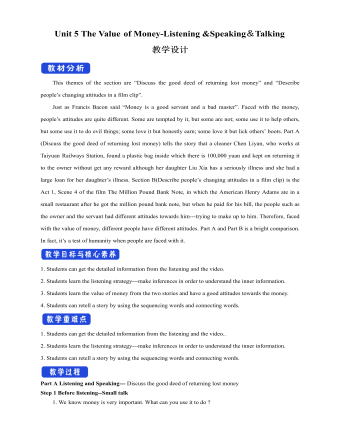
新人教版高中英语必修3Unit 5 The Value of Money-Listening &Speaking&Talking教学设计
4. A:We’d like to have someone to say a word at the beginning to welcome the group.B:↙Who?A:We thought that you or Dr.Johnson might do it.B用降调说Who,其意思是问,对方想让谁在开场时致欢迎词。Step 6 Pronunciation---Practice1. Listen to the short conversation and mark the intonation with ↗, ↙ or ↙, ↗. Then discuss with a partner what they intend to convey by using different intonation.Owner: You know what ?↗ It’s a million-pound bank note↙.Waiter 1: Really ?↗(question)Waiter 2: Really !↙(unbelievable and surprised)Waiter 3: Really ?!↙↗(first question then surprised)2. Listen to the conversations. Underline the parts that are stressed and mark the intonation. Then talk about the implied meanings of the responses with different intonations. Listen again and repeat.1) Henry: It’s a nice suit.Owner: Oh, it’s perfect!↙(The intonation means it is very suitable for Henry.)2) Henry: Well, that’s very kind of you.Owner: Kind, sir ?↗(what you said is not right) No, it’s kind of you. You must come whenever you want and have whatever you like. Just having you sit here is a great honour !!↙(welcome you to come again)3)Henry:Well, to be honest, I have none. Oliver:(happily) What luck!(excited) Brother↗, what luck!↙(It means “Didn’t you hear it?”)Henry: Well, it may seem lucky to you but not to me!↗(angry) If this is your idea of some kind of joke, I don’t think it’s very funny. Now if you’ll excuse me, I ought to be on my way.↙(If so, I would leave.)Roderick: Please don’t go↙...(hope Henry can wait for a moment)Part B Viewing and Talking---Describe people’s changing attitudes in a film clipStep 1 Before-listening---Tell the filmYou are going to watch part of the film The Million Pound Bank Note. Look at these photos and guess what happens in the film.
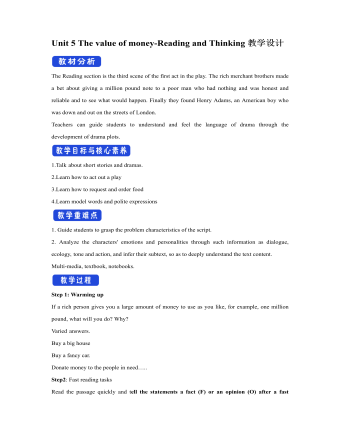
新人教版高中英语必修3Unit 5 The value of money-Reading and Thinking教学设计二
? Could you offer me some kind of work here?? I don’t want your charity, I just want an honest job.? Careless: I landed in Britain by accident.Step 7:Consolidation.? Find Henry? Roderick and Oliver were I .making a bet when they saw Henry, a poor young man. ? Know Henry? About a month ago, Henry was sailing and later he found himself carried out to sea by a strong wind. Fortunately, he 2.was spotted by a ship. And it was the ship that brought him to 3.England? Offer money to Henry ? Oliver and Roderick gave Henry a letter and told him that there was money in it. They 4.persuaded him to accept it, and made him 5.promise that it wouldn't be opened until 2 o'clock.Step 8:Language pointsa large amount of: a large quantity of; a great deal ofe.g. They bought a large amount of furniture before they moved their new house.make a bet: make an arrangement to risk money, etc. on an event of which the result is doubtful.e.g. We made a bet on the result of the match.permit sb to do something: allow somebody to do somethinge.g. My mother doesn’t permit me to ride in the street after it rained.by accident: as a result of chancee.g. I only found it by accident.stare at: look at somebody or something with the eyes wide open in a fixed gaze( in astonishment, wonder, fear, etc)to be honest: to tell you the truth; to be franke.g. To be honest, I don’t think we have a chance of winning.Step7 Homework:What do you think will happen to Henry? Will the bank-note help him or get him into trouble?
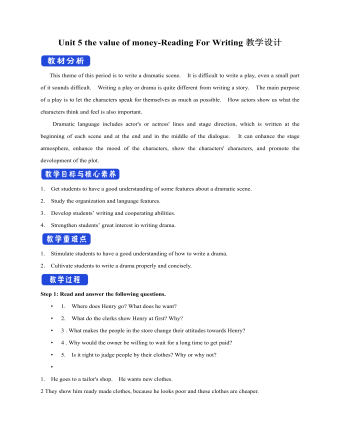
新人教版高中英语必修3Unit 5 the value of money-Reading For Writing教学设计一
【参考范文】Narrator:(Henry is smiling as he leaves the restaurant. As he is walking down the street, he sees a sign for a place that cuts hair. He decides to get it cut. )H=Henry;B=Barber;R=rude manH:Good afternoon, I'd like to get a cut, if I may. (The barber looks at Henry's hair and continues cutting another man's hair. )Er, I'd really like a haircut. As you can see it's much too long. B:(in a rude manner) Yes, I can see that. Indeed, I can. H:Fine, well I'll have a seat then. (He sits in one of the barber's chairs. The barber turns to look at Henry. )B:It's quite expensive here, you know!Are you sure you can afford it?H:Yes. I think so. (In comes the rude man. )R:Hey you there. I need a haircut quickly. Can you do me straightaway?B:All right, then, get in the chair and I'll see what I can do. R:Thank you. (sits down in one of the barber's chairs)H:Excuse me, but I was here first. Aren't you going to do my hair first?B:This man's in a hurry. H:Well so am I!I insist that you cut my hair first. B:OK, but I'll have to be quick. This gentleman is waiting. H:Thank you. (They both become quiet. After his hair is cut, the barber tells Henry how much he must pay. Henry shows the barber the bank note. )B:Why, Mr . . . (looks shocked)H:Adams. Henry Adams. I'm sorry, I don't have any change. R:You're that Mr Adams! Well,I'm glad I waited or I might never have known it was you. B:Why, Mr Adams, please don't worry!(wearing a big smile) Nothing to worry about!Nothing at all!Please come back any time, even if you only need too little hairs cut!It will be my honour to serve you!
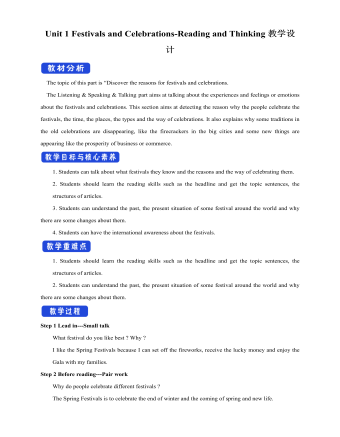
新人教版高中英语必修3Unit 1 Festivals and Celebrations-Reading and Thinking教学设计
The topic of this part is “Discover the reasons for festivals and celebrations.The Listening & Speaking & Talking part aims at talking about the experiences and feelings or emotions about the festivals and celebrations. This section aims at detecting the reason why the people celebrate the festivals, the time, the places, the types and the way of celebrations. It also explains why some traditions in the old celebrations are disappearing, like the firecrackers in the big cities and some new things are appearing like the prosperity of business or commerce. 1. Students can talk about what festivals they know and the reasons and the way of celebrating them.2. Students should learn the reading skills such as the headline and get the topic sentences, the structures of articles.3. Students can understand the past, the present situation of some festival around the world and why there are some changes about them. 4. Students can have the international awareness about the festivals.1. Students should learn the reading skills such as the headline and get the topic sentences, the structures of articles.2. Students can understand the past, the present situation of some festival around the world and why there are some changes about them.Step 1 Lead in---Small talkWhat festival do you like best ? Why ?I like the Spring Festivals because I can set off the fireworks, receive the lucky money and enjoy the Gala with my families.Step 2 Before reading---Pair workWhy do people celebrate different festivals ?The Spring Festivals is to celebrate the end of winter and the coming of spring and new life.The Mid-autumn Day is to celebrate the harvest and admire the moon.
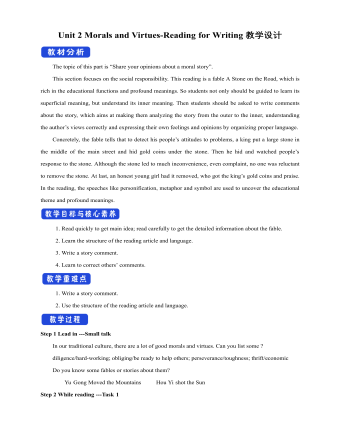
新人教版高中英语必修3Unit 2 Morals and Virtues-Reading for Writing教学设计
1. 这个寓言是一个关于一位国王古寓言。 The fable is an old fable about a king.2.作者用这个故事让读者对于社区的问题负有个人责任的必要印象深刻。The author used the story to impress upon readers with the need to take personal responsibility for problems in the community.3. 这个故事十分成功的实现了它的目的。The story was quite successful in achieving its purpose.Step 7 WritingPlease write a review of the story according the outline above.The fable is an old fable about a king who thought his people are lazy, so he put a large stone in the middle of the road and hides and waited to see if anyone will try to move it.The author used this story to impress upon readers with the need to take personal responsibility for problems in the community. The story was quite successful in achieving its purpose, and I liked it because it had a clear moral.However, while the moral of the story is clear, the actions of the king seemed pointless to me, because none of the characters in the story learnt anything. For this reason, I think there are better stories that can be used to impress upon people with the need for personal responsibility.Step 8 Pair workExchange drafts with a partner. Use this checklist to help your partner revise his/her draft.1. Does the writer give a short description of the story ?2. Does the description include the most important details of the story ?3. Does the writer give his or her opinion about the character or their actions ?4. Is the review well-organised ? 5. Does the writer use the -ing form as the adverbial correctly in the writing ?6. Are there any grammar, spelling, or punctuation errors ?Step 9 HomeworkPut up your revised draft in the classroom or read it to your class.
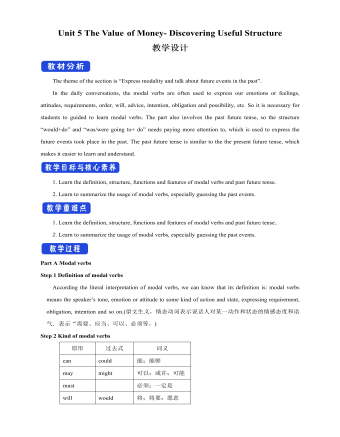
新人教版高中英语必修3Unit 5 The Value of Money- Discovering Useful Structure教学设计
Step 3 Meaning1. 过去将来时表示从过去某一时间来看将要发生的动作或存在的状态, 常用在宾语从句中。一般由“would/should +动词原形”构成。She hoped that they would meet again someday. 她希望将来有一天他们能再见面。2. was/were going to+动词原形: 表示过去将要发生或很有可能发生的动作, 常用于口语中, 表示预言、意图或者打算等。He was going to start work the following week. 他打算下星期开始工作。3. was/were about to do: 常用来表示即将发生的动作, “刚要/正要做……”。注意该结构不与任何时间状语连用。I felt that something terrible was about to happen. 我感到某种可怕的事情即将发生。4.was/were to do: 表示“曾计划做某事”, 如果表示“本来计划做某事, 动作没实现”, 则需用 “was/were to have done”。She said she was to have told me about the accident. 她说她本来想告诉我关于事故的事。5.Start, go, come, leave, see, meet等动词的过去进行时: 表示就过去某一时刻而言即将发生的动作。She was coming later. 她随后就来。I had just put on my overcoat and was leaving to visit a friend of mine. 我刚穿上外套要去看我的一个朋友。
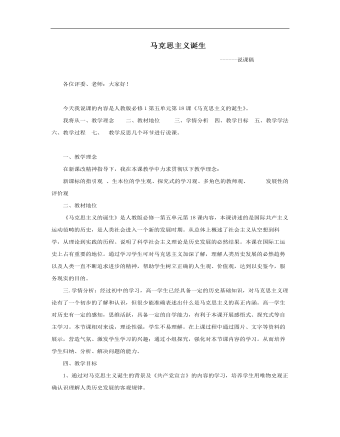
高中历史人教版必修一《马克思主义的诞生》说课稿
一、教学理念在新课改精神指导下,我在本课教学中力求贯彻以下教学理念:新课标的指引观 、生本位的学生观、探究式的学习观、多角色的教师观、 发展性的评价观二、教材地位《马克思主义的诞生》是人教版必修一第五单元第18课内容,本课讲述的是国际共产主义运动范畴的历史,是人类社会进入一个新的发展时期。从总体上概述了社会主义从空想到科学,从理论到实践的历程。说明了科学社会主义理论是历史发展的必然结果。本课在国际工运史上占有重要的地位。通过学习学生可对马克思主义加深了解,理解人类历史发展的必然趋势以及人类一直不断追求进步的精神,帮助学生树立正确的人生观、价值观,达到以史鉴今,服务现实的目的。
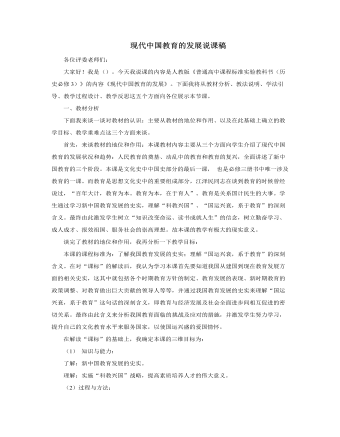
人教版高中历史必修3现代中国教育的发展说课稿
一、教材分析下面我来谈一谈对教材的认识:主要从教材的地位和作用、以及在此基础上确立的教学目标、教学重难点这三个方面来谈。首先,来谈教材的地位和作用:本课教材内容主要从三个方面向学生介绍了现代中国教育的发展状况和趋势:人民教育的奠基、动乱中的教育和教育的复兴,全面讲述了新中国教育的三个阶段。本课是文化史中中国史部分的最后一课, 也是必修三册书中唯一涉及教育的一课。而教育是思想文化史中的重要组成部分,江泽民同志在谈到教育的时候曾经说过,“百年大计,教育为本。教育为本,在于育人”。教育是关系国计民生的大事。学生通过学习新中国教育发展的史实,理解“科教兴国”、“国运兴衰,系于教育”的深刻含义。最终由此激发学生树立“知识改变命运、读书成就人生”的信念,树立勤奋学习、成人成才、报效祖国、服务社会的崇高理想。故本课的教学有极大的现实意义。谈完了教材的地位和作用,我再分析一下教学目标:
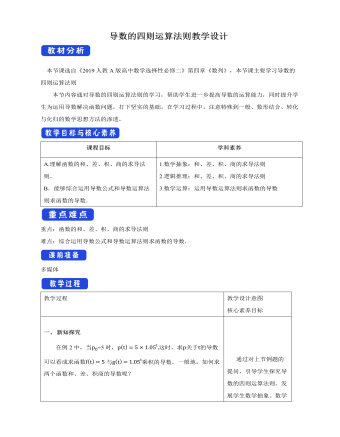
人教版高中数学选择性必修二导数的四则运算法则教学设计
求函数的导数的策略(1)先区分函数的运算特点,即函数的和、差、积、商,再根据导数的运算法则求导数;(2)对于三个以上函数的积、商的导数,依次转化为“两个”函数的积、商的导数计算.跟踪训练1 求下列函数的导数:(1)y=x2+log3x; (2)y=x3·ex; (3)y=cos xx.[解] (1)y′=(x2+log3x)′=(x2)′+(log3x)′=2x+1xln 3.(2)y′=(x3·ex)′=(x3)′·ex+x3·(ex)′=3x2·ex+x3·ex=ex(x3+3x2).(3)y′=cos xx′=?cos x?′·x-cos x·?x?′x2=-x·sin x-cos xx2=-xsin x+cos xx2.跟踪训练2 求下列函数的导数(1)y=tan x; (2)y=2sin x2cos x2解析:(1)y=tan x=sin xcos x,故y′=?sin x?′cos x-?cos x?′sin x?cos x?2=cos2x+sin2xcos2x=1cos2x.(2)y=2sin x2cos x2=sin x,故y′=cos x.例5 日常生活中的饮用水通常是经过净化的,随着水的纯净度的提高,所需进化费用不断增加,已知将1t水进化到纯净度为x%所需费用(单位:元),为c(x)=5284/(100-x) (80<x<100)求进化到下列纯净度时,所需进化费用的瞬时变化率:(1) 90% ;(2) 98%解:净化费用的瞬时变化率就是净化费用函数的导数;c^' (x)=〖(5284/(100-x))〗^'=(5284^’×(100-x)-"5284 " 〖(100-x)〗^’)/〖(100-x)〗^2 =(0×(100-x)-"5284 " ×(-1))/〖(100-x)〗^2 ="5284 " /〖(100-x)〗^2
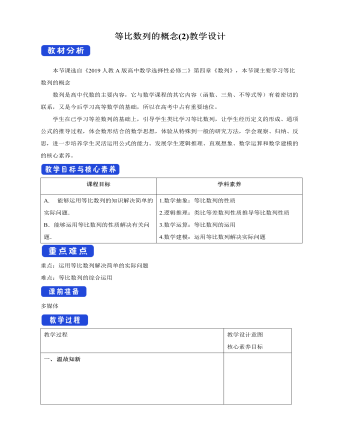
人教版高中数学选择性必修二等比数列的概念 (2) 教学设计
二、典例解析例4. 用 10 000元购买某个理财产品一年.(1)若以月利率0.400%的复利计息,12个月能获得多少利息(精确到1元)?(2)若以季度复利计息,存4个季度,则当每季度利率为多少时,按季结算的利息不少于按月结算的利息(精确到10^(-5))?分析:复利是指把前一期的利息与本金之和算作本金,再计算下一期的利息.所以若原始本金为a元,每期的利率为r ,则从第一期开始,各期的本利和a , a(1+r),a(1+r)^2…构成等比数列.解:(1)设这笔钱存 n 个月以后的本利和组成一个数列{a_n },则{a_n }是等比数列,首项a_1=10^4 (1+0.400%),公比 q=1+0.400%,所以a_12=a_1 q^11 〖=10〗^4 (1+0.400%)^12≈10 490.7.所以,12个月后的利息为10 490.7-10^4≈491(元).解:(2)设季度利率为 r ,这笔钱存 n 个季度以后的本利和组成一个数列{b_n },则{b_n }也是一个等比数列,首项 b_1=10^4 (1+r),公比为1+r,于是 b_4=10^4 (1+r)^4.
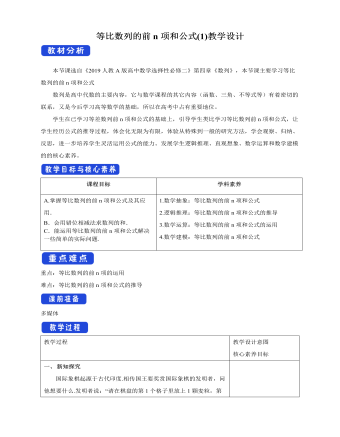
人教版高中数学选择性必修二等比数列的前n项和公式 (1) 教学设计
新知探究国际象棋起源于古代印度.相传国王要奖赏国际象棋的发明者,问他想要什么.发明者说:“请在棋盘的第1个格子里放上1颗麦粒,第2个格子里放上2颗麦粒,第3个格子里放上4颗麦粒,依次类推,每个格子里放的麦粒都是前一个格子里放的麦粒数的2倍,直到第64个格子.请给我足够的麦粒以实现上述要求.”国王觉得这个要求不高,就欣然同意了.假定千粒麦粒的质量为40克,据查,2016--2017年度世界年度小麦产量约为7.5亿吨,根据以上数据,判断国王是否能实现他的诺言.问题1:每个格子里放的麦粒数可以构成一个数列,请判断分析这个数列是否是等比数列?并写出这个等比数列的通项公式.是等比数列,首项是1,公比是2,共64项. 通项公式为〖a_n=2〗^(n-1)问题2:请将发明者的要求表述成数学问题.
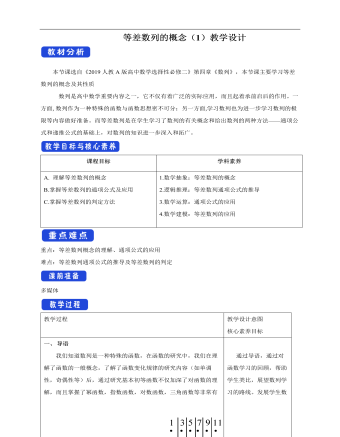
人教版高中数学选择性必修二等差数列的概念(1)教学设计
我们知道数列是一种特殊的函数,在函数的研究中,我们在理解了函数的一般概念,了解了函数变化规律的研究内容(如单调性,奇偶性等)后,通过研究基本初等函数不仅加深了对函数的理解,而且掌握了幂函数,指数函数,对数函数,三角函数等非常有用的函数模型。类似地,在了解了数列的一般概念后,我们要研究一些具有特殊变化规律的数列,建立它们的通项公式和前n项和公式,并应用它们解决实际问题和数学问题,从中感受数学模型的现实意义与应用,下面,我们从一类取值规律比较简单的数列入手。新知探究1.北京天坛圜丘坛,的地面有十板布置,最中间是圆形的天心石,围绕天心石的是9圈扇环形的石板,从内到外各圈的示板数依次为9,18,27,36,45,54,63,72,81 ①2.S,M,L,XL,XXL,XXXL型号的女装上对应的尺码分别是38,40,42,44,46,48 ②3.测量某地垂直地面方向上海拔500米以下的大气温度,得到从距离地面20米起每升高100米处的大气温度(单位℃)依次为25,24,23,22,21 ③
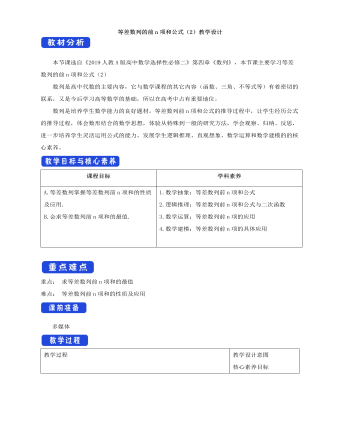
人教版高中数学选择性必修二等差数列的前n项和公式(2)教学设计
课前小测1.思考辨析(1)若Sn为等差数列{an}的前n项和,则数列Snn也是等差数列.( )(2)若a1>0,d<0,则等差数列中所有正项之和最大.( )(3)在等差数列中,Sn是其前n项和,则有S2n-1=(2n-1)an.( )[答案] (1)√ (2)√ (3)√2.在项数为2n+1的等差数列中,所有奇数项的和为165,所有偶数项的和为150,则n等于( )A.9 B.10 C.11 D.12B [∵S奇S偶=n+1n,∴165150=n+1n.∴n=10.故选B项.]3.等差数列{an}中,S2=4,S4=9,则S6=________.15 [由S2,S4-S2,S6-S4成等差数列得2(S4-S2)=S2+(S6-S4)解得S6=15.]4.已知数列{an}的通项公式是an=2n-48,则Sn取得最小值时,n为________.23或24 [由an≤0即2n-48≤0得n≤24.∴所有负项的和最小,即n=23或24.]二、典例解析例8.某校新建一个报告厅,要求容纳800个座位,报告厅共有20排座位,从第2排起后一排都比前一排多两个座位. 问第1排应安排多少个座位?分析:将第1排到第20排的座位数依次排成一列,构成数列{an} ,设数列{an} 的前n项和为S_n。
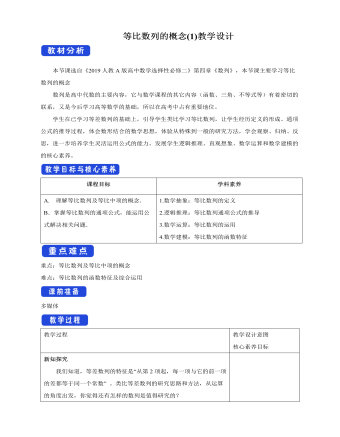
人教版高中数学选择性必修二等比数列的概念 (1) 教学设计
新知探究我们知道,等差数列的特征是“从第2项起,每一项与它的前一项的差都等于同一个常数” 。类比等差数列的研究思路和方法,从运算的角度出发,你觉得还有怎样的数列是值得研究的?1.两河流域发掘的古巴比伦时期的泥版上记录了下面的数列:9,9^2,9^3,…,9^10; ①100,100^2,100^3,…,100^10; ②5,5^2,5^3,…,5^10. ③2.《庄子·天下》中提到:“一尺之锤,日取其半,万世不竭.”如果把“一尺之锤”的长度看成单位“1”,那么从第1天开始,每天得到的“锤”的长度依次是1/2,1/4,1/8,1/16,1/32,… ④3.在营养和生存空间没有限制的情况下,某种细菌每20 min 就通过分裂繁殖一代,那么一个这种细菌从第1次分裂开始,各次分裂产生的后代个数依次是2,4,8,16,32,64,… ⑤4.某人存入银行a元,存期为5年,年利率为 r ,那么按照复利,他5年内每年末得到的本利和分别是a(1+r),a〖(1+r)〗^2,a〖(1+r)〗^3,a〖(1+r)〗^4,a〖(1+r)〗^5 ⑥





















